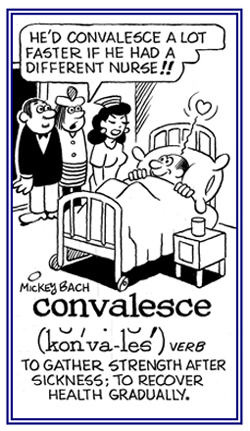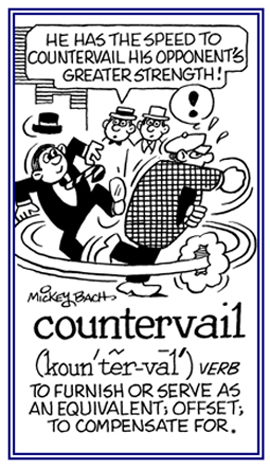valid-, val-, vale-, -vail, -valent, -valence
(Latin: valere, to be strong, to be well, to be worth; strong; power, strength; and "fare well" [go with strength])
bivalence
bivalent
convalesce (verb), convalesces; convalesced; convalescing
To recover from sickness, to regain health, and to get better or stronger: Jonathan started to convalesce from his operation after he had been in bed for ten days.

© ALL rights are reserved.
Go to this Word A Day Revisited Index

Go to this Word A Day Revisited Index
so you can see more of Mickey Bach's cartoons.
The gradual recuperation or recovery time after an illness or injury: The doctor told Jonus, the football player, that he needed a convalescence of several weeks because of his sprained ankle.

© ALL rights are reserved.
Go to this Word A Day Revisited Index

Go to this Word A Day Revisited Index
so you can see more of Mickey Bach's cartoons.
convalescent
1. Recovering health and strength after illness; on the way to recovery; still in need of nursing.
2. One who is recovering from sickness.
2. One who is recovering from sickness.
convalescently
countervail (verb), countervails; countervailed; countervailing
To act against or to resist with equal force; to counterbalance a condition or situation: It seemed like the terrific thunderstorms in France tended to countervail, or offset, the family’s plans to go there on vacation.

© ALL rights are reserved.
Go to this Word A Day Revisited Index

Go to this Word A Day Revisited Index
so you can see more of Mickey Bach's cartoons.
devaluate, devalue
To lessen or annul the value of.
devaluation
The reduction of the official value of a currency in terms of gold or of another currency.
electrovalence
1. The ionic linkage between atoms in which each accepts or donates electrons so that every atom ends up with a completed electron shell.
2. The combining power of an element, measured by the number of electrons one atom of it acquires from or transfers to another atom during the formation of a chemical compound.
3. The number of electrons which an atom tends to lose or to accept by transfer in a chemical reaction.
4. The number of positive or negative charges that an atom acquires by transferring its electrons to another atom to form a compound.
2. The combining power of an element, measured by the number of electrons one atom of it acquires from or transfers to another atom during the formation of a chemical compound.
3. The number of electrons which an atom tends to lose or to accept by transfer in a chemical reaction.
4. The number of positive or negative charges that an atom acquires by transferring its electrons to another atom to form a compound.
This is the chemical bond that results from such a process; an ionic bond.
electrovalent
1. Relating to or a reference to an electrovalence or to an electrovalent bond or an ionic bond.
2. The number of charges an atom acquires in a chemical reaction by a gain or a loss of electrons and the bonding resulting from such a transfer of electrons.
2. The number of charges an atom acquires in a chemical reaction by a gain or a loss of electrons and the bonding resulting from such a transfer of electrons.
equivalence
1. The fact of being the same, effectively the same, or interchangeable with something else.
2. In logic, the relationship that holds for two propositions that are either both true or both false, so that the affirmation of one and the denial of the other results in contradiction.
3. The relationship between two statements, both of which are either true or false, and each of which can be proven from the other.
2. In logic, the relationship that holds for two propositions that are either both true or both false, so that the affirmation of one and the denial of the other results in contradiction.
3. The relationship between two statements, both of which are either true or false, and each of which can be proven from the other.
equivalency
The state or condition of being equivalent; equality.
equivalent
1. Equal, as in force, value, or meaning.
2. Having identical or similar effects.
3. A state of being essentially equal or equivalent; equally balanced.
2. Having identical or similar effects.
3. A state of being essentially equal or equivalent; equally balanced.
equivalently
Characterized by being equal in power, force, or value.


